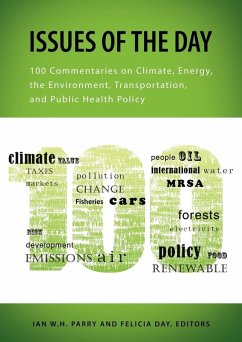Ian W. H. Parry, Felicia Day
Issues of the Day
100 Commentaries on Climate, Energy, the Environment, Transportation, and Public Health Policy
Ian W. H. Parry, Felicia Day
Issues of the Day
100 Commentaries on Climate, Energy, the Environment, Transportation, and Public Health Policy
- Broschiertes Buch
- Merkliste
- Auf die Merkliste
- Bewerten Bewerten
- Teilen
- Produkt teilen
- Produkterinnerung
- Produkterinnerung
Issues of the Day provides an easy way for students, academics, journalists, policymakers, and the public to learn about a diverse range of policy issues affecting the environment, energy, transportation, and public health. Each commentary gives a short assessment of a topic, summarizing in a non-technical way the current state of analysis or evidence on the issue, along with selected recommendations for further reading. The essays are written by world renowned scholars, mostly economists, and provide useful insights on policy problems that are often complex and poorly understood. Some of the…mehr
Andere Kunden interessierten sich auch für
![The Justices and Injustices of Ecosystem Services The Justices and Injustices of Ecosystem Services]() The Justices and Injustices of Ecosystem Services174,99 €
The Justices and Injustices of Ecosystem Services174,99 €![The Day After: The Life and Times of a New York FBI Agent The Day After: The Life and Times of a New York FBI Agent]() Jason RandazzoThe Day After: The Life and Times of a New York FBI Agent28,99 €
Jason RandazzoThe Day After: The Life and Times of a New York FBI Agent28,99 €![Global Water Ethics Global Water Ethics]() Global Water Ethics181,99 €
Global Water Ethics181,99 €![Your Day in Court Your Day in Court]() Russell B. FranzenYour Day in Court10,99 €
Russell B. FranzenYour Day in Court10,99 €![Just Another Day Just Another Day]() Jason RandazzoJust Another Day26,99 €
Jason RandazzoJust Another Day26,99 €![Notorious RBG Notorious RBG]() Irin CarmonNotorious RBG18,99 €
Irin CarmonNotorious RBG18,99 €![Gegen Täuschungen und Gesundheitsgefährdungen durch schlechte Nahrung Gegen Täuschungen und Gesundheitsgefährdungen durch schlechte Nahrung]() Sandy SchenkerGegen Täuschungen und Gesundheitsgefährdungen durch schlechte Nahrung81,70 €
Sandy SchenkerGegen Täuschungen und Gesundheitsgefährdungen durch schlechte Nahrung81,70 €-
-
-
Issues of the Day provides an easy way for students, academics, journalists, policymakers, and the public to learn about a diverse range of policy issues affecting the environment, energy, transportation, and public health. Each commentary gives a short assessment of a topic, summarizing in a non-technical way the current state of analysis or evidence on the issue, along with selected recommendations for further reading. The essays are written by world renowned scholars, mostly economists, and provide useful insights on policy problems that are often complex and poorly understood. Some of the topics covered include air pollution, hazardous waste, voluntary environmental programs, domestic (U.S.) and global climate policy design, fishery management, water quality, endangered species, forest fires, oil security, solar power, road and airport, fuel taxes and fuel economy standards, alternative fuel vehicles, health and longevity, smoking, malaria, tuberculosis, and the environment and development. The objective is to disseminate the findings of sound, objective research on the costs, benefits, and appropriate reform of public policies. The book provides a useful supplement for undergraduate- and graduate-level course reading, a reference guide for professionals, and a way for the general reader to quickly develop an informed perspective on the most important policy problems of the day. Issues of the Day is available to download as a PDF from the Resources for the Future website: www.rff.org/weeklycommentary
Produktdetails
- Produktdetails
- Verlag: Routledge
- Seitenzahl: 230
- Erscheinungstermin: 20. Mai 2010
- Englisch
- Abmessung: 297mm x 210mm x 13mm
- Gewicht: 609g
- ISBN-13: 9781933115870
- ISBN-10: 1933115874
- Artikelnr.: 28885170
- Herstellerkennzeichnung
- Libri GmbH
- Europaallee 1
- 36244 Bad Hersfeld
- gpsr@libri.de
- Verlag: Routledge
- Seitenzahl: 230
- Erscheinungstermin: 20. Mai 2010
- Englisch
- Abmessung: 297mm x 210mm x 13mm
- Gewicht: 609g
- ISBN-13: 9781933115870
- ISBN-10: 1933115874
- Artikelnr.: 28885170
- Herstellerkennzeichnung
- Libri GmbH
- Europaallee 1
- 36244 Bad Hersfeld
- gpsr@libri.de
Ian W.H. Parry (Ph.D. U Chicago) is a senior fellow at Resources for the Future. Felicia Day is managing editor in the communications department of Resources for the Future.
Editor's Introduction.
Global Environmental Challenges
1. Stabilizing Atmospheric CO2 with Incomplete International Cooperation.
2. A Pragmatic Global Climate Policy Architecture.
3. Thinking Beyond Borders: Why We Need to Focus on Global Public Goods.
4. The Value of Climate-Related Satellite Data.
5. The Successful International Response to Stratospheric Ozone Depletion.
6. Evaluating Europe's Plan for Reducing Greenhouse Gases.
7. Climate Change Policy in the United States: Previewing the Debate.
8. Which Is the Better Climate Policy: Emissions Taxes or Emissions
Trading?
9. Should Cap-and-Trade Systems be Supplemented with Renewable Portfolio
Standards?
10. Inducing Innovation for Climate Change Mitigation.
11. How Should Emissions Allowance Auctions Be Designed?
12. Competitiveness, Emissions Leakage, and Climate Policy.
13. Addressing Biodiversity and Global Warming by Preserving Tropical
Forests.
14. Forests in a U.S. Climate Program: Promising, but the Key is
Implementation.
15. Emissions Offsets in a Greenhouse Gas Cap-and-Trade Policy.
16. Ethics and Discounting Global Warming Damages.
17. Climate Change Abatement: Not 'Stern' Enough?
18. Evaluating Climate Risks in Coastal Zones.
Energy Policies
19. Reflections on Three Decades of US Energy Policy.
20. The Oil Security Problem: 'D j Vu All Over Again'.
21. Reassessing Oil Security.
22. The 2008 Oil Price Shock: Markets or Mayhem?
23. The Cost of Protecting Oil in the Persian Gulf.
24. What Role for 'Synthetic' Liquid Fuels? A Look at Canadian Oil Sands.
25. FutureGen: How to Burn Coal-Maybe-without Contributing to Climate
Change.
26. The Economics of New Green Technology Investment: The Case of Satellite
Solar Power.
27. Oil and the Arctic National Wildlife Refuge.
28. Oil Spills: The Deterrent Effects of Monitoring, Enforcement, and
Public Information.
29. Taking a Closer Look at Energy Subsidies in the Federal Tax Code.
30. Learning by Doing and the California Solar Initiative.
31. Opposing the Chicken or Opposing the Egg? New Challenges in Siting
Networked Energy Facilities.
32. The Greening of Buildings.
33. Why International Natural Gas Markets Matter in Today's Energy and
Environmental Picture.
34. Assessing Electricity Markets: Prospects and Pitfalls.
National Environmental Policies
35. What Are the Biggest Environmental Challenges Facing the United States?
36. Where Things Stand with Hazardous Waste Regulation.
37. Reinstating the Superfund Taxes: Good or Bad Policy?
38. Trash Talk.
39. The New Economics of Managing the Nation's Waste.
40. Enhancing Productivity while Safeguarding Environmental Quality: The
Inherent Challenges in Regulating Pesticides.
41. Why We Need to Treat Nitrogen as a Systems Problem.
42. The Effectiveness of Voluntary Environmental Programs.
43. Does 'Green' Corporate Social Responsibility Benefit Society?
44. The Evolving SO2 Allowance Market: Title IV, CAIR and Beyond.
45. The Cooling Water Intake Structures Rule: An Experiment with More
Flexible Regulation.
46. The Future of Regulatory Oversight and Analysis.
47. A Plea for Environmental Accounts.
48. The Political Economy of Environmental Justice.
Spencer Banzhaf
49. Overcoming Distributional Obstacles to Market-Based Environmental
Policies.
50. What Do the Damages Caused by U.S. Air Pollution Cost?
51. What Can Policymakers Learn from Experimental Economics?
52. Environmental Federalism.
Managing Natural Resources
53. Can Catch Shares Save Fisheries?
54. The Political Economy of Addressing Overfishing in U.S. Waters.
55. Achieving Efficient Coordination and Acceptance in Fishery Reform.
56. Restoring Great Lakes Ecosystems: Worth the Cost?
57. The Gulf of Mexico's Dead Zone: Mess, Problem, or Puzzle?
58. Information Disclosure and Drinking Water Quality.
59. Western Water Law and Efficient Use of Water Resources.
60. A New Approach to Reforming the National Flood Insurance Program.
61. Perverse Incentives and the Endangered Species Act.
62. Improving Investments in Biodiversity Conservation.
63. USDA's Conservation Reserve Program: Is It Time to Ease into Easements?
64. How Should We Tackle the Forest Fire Problem?
65. Options Contracts for Contingent Takings: A Tool for Improving Disaster
Management.
Transportation and Urban Policy
66. Triple Convergence toward a Higher Gasoline Tax.
67. The Price of Gas and the Demand for Fuel Economy: Are there any links?
68. Should Distributional Considerations Hold Up Higher Gasoline Taxes?
69. Does the Federal Government Spend Too Much for Highways, or Too Little?
70. The Benefits and Costs of Tighter Fuel Economy Regulations.
71. Pay-As-You-Drive Auto Insurance.
72. What Motivates People to Buy Hybrids?
73. The Outlook for Hydrogen Cars.
74. Useful Lessons from California's Experiment with Congestion Pricing.
75. Congestion Pricing: Lessons from London.
76. Has the Time Come for Truck-Only Toll Lanes?
77. Using the Price System to Reduce Airport Congestion.
78. Delayed: Is Privatizing America's Airports the Answer?
79. Telecommuting: What is it Good For?
80. Declining Traffic Fatalities: Lessons for Developing Countries?
81. Preservation and Development: Can TDRs Improve Land Markets?
82. Is there an 'Efficient' Way to Address Suburban Sprawl?
Public Health Policies
83. The Value of Health and Longevity.
84. How U.S. and Chinese Citizens Feel about Reducing Mortality Risks.
85. A New Chapter in the History of Malaria Control.
86. The Spread of MRSA: Antibiotic Resistance with a Name.
87. Controlling Tuberculosis: What Is the Benefit, At What Cost?
88. Bringing our Food Safety System into the 21st Century.
89. Tobacco Taxation in the European Union and United States.
90. How Advertising for Smoking-Cessation Products Can Help Meet Public
Health Goals.
91. Mercury Advisories for Commercial Fish.
92. Measuring the Benefits of Reduced Exposure to Lead.
93. Indoor Air Pollution and African Death Rates.
Environment and Development
94. Driving Restrictions and Air Quality in Mexico City.
95. Deciphering the Demand for Safe Drinking Water in Low-Income Countries.
96. Environmental Policy Innovations in Developing Countries.
97. Green Cities and Economic Development.
98. Building Better Housing Policies for the Developing World's Poor.
99. The Future of Famine.
100. Is Population Still an Important Policy Issue?
Global Environmental Challenges
1. Stabilizing Atmospheric CO2 with Incomplete International Cooperation.
2. A Pragmatic Global Climate Policy Architecture.
3. Thinking Beyond Borders: Why We Need to Focus on Global Public Goods.
4. The Value of Climate-Related Satellite Data.
5. The Successful International Response to Stratospheric Ozone Depletion.
6. Evaluating Europe's Plan for Reducing Greenhouse Gases.
7. Climate Change Policy in the United States: Previewing the Debate.
8. Which Is the Better Climate Policy: Emissions Taxes or Emissions
Trading?
9. Should Cap-and-Trade Systems be Supplemented with Renewable Portfolio
Standards?
10. Inducing Innovation for Climate Change Mitigation.
11. How Should Emissions Allowance Auctions Be Designed?
12. Competitiveness, Emissions Leakage, and Climate Policy.
13. Addressing Biodiversity and Global Warming by Preserving Tropical
Forests.
14. Forests in a U.S. Climate Program: Promising, but the Key is
Implementation.
15. Emissions Offsets in a Greenhouse Gas Cap-and-Trade Policy.
16. Ethics and Discounting Global Warming Damages.
17. Climate Change Abatement: Not 'Stern' Enough?
18. Evaluating Climate Risks in Coastal Zones.
Energy Policies
19. Reflections on Three Decades of US Energy Policy.
20. The Oil Security Problem: 'D j Vu All Over Again'.
21. Reassessing Oil Security.
22. The 2008 Oil Price Shock: Markets or Mayhem?
23. The Cost of Protecting Oil in the Persian Gulf.
24. What Role for 'Synthetic' Liquid Fuels? A Look at Canadian Oil Sands.
25. FutureGen: How to Burn Coal-Maybe-without Contributing to Climate
Change.
26. The Economics of New Green Technology Investment: The Case of Satellite
Solar Power.
27. Oil and the Arctic National Wildlife Refuge.
28. Oil Spills: The Deterrent Effects of Monitoring, Enforcement, and
Public Information.
29. Taking a Closer Look at Energy Subsidies in the Federal Tax Code.
30. Learning by Doing and the California Solar Initiative.
31. Opposing the Chicken or Opposing the Egg? New Challenges in Siting
Networked Energy Facilities.
32. The Greening of Buildings.
33. Why International Natural Gas Markets Matter in Today's Energy and
Environmental Picture.
34. Assessing Electricity Markets: Prospects and Pitfalls.
National Environmental Policies
35. What Are the Biggest Environmental Challenges Facing the United States?
36. Where Things Stand with Hazardous Waste Regulation.
37. Reinstating the Superfund Taxes: Good or Bad Policy?
38. Trash Talk.
39. The New Economics of Managing the Nation's Waste.
40. Enhancing Productivity while Safeguarding Environmental Quality: The
Inherent Challenges in Regulating Pesticides.
41. Why We Need to Treat Nitrogen as a Systems Problem.
42. The Effectiveness of Voluntary Environmental Programs.
43. Does 'Green' Corporate Social Responsibility Benefit Society?
44. The Evolving SO2 Allowance Market: Title IV, CAIR and Beyond.
45. The Cooling Water Intake Structures Rule: An Experiment with More
Flexible Regulation.
46. The Future of Regulatory Oversight and Analysis.
47. A Plea for Environmental Accounts.
48. The Political Economy of Environmental Justice.
Spencer Banzhaf
49. Overcoming Distributional Obstacles to Market-Based Environmental
Policies.
50. What Do the Damages Caused by U.S. Air Pollution Cost?
51. What Can Policymakers Learn from Experimental Economics?
52. Environmental Federalism.
Managing Natural Resources
53. Can Catch Shares Save Fisheries?
54. The Political Economy of Addressing Overfishing in U.S. Waters.
55. Achieving Efficient Coordination and Acceptance in Fishery Reform.
56. Restoring Great Lakes Ecosystems: Worth the Cost?
57. The Gulf of Mexico's Dead Zone: Mess, Problem, or Puzzle?
58. Information Disclosure and Drinking Water Quality.
59. Western Water Law and Efficient Use of Water Resources.
60. A New Approach to Reforming the National Flood Insurance Program.
61. Perverse Incentives and the Endangered Species Act.
62. Improving Investments in Biodiversity Conservation.
63. USDA's Conservation Reserve Program: Is It Time to Ease into Easements?
64. How Should We Tackle the Forest Fire Problem?
65. Options Contracts for Contingent Takings: A Tool for Improving Disaster
Management.
Transportation and Urban Policy
66. Triple Convergence toward a Higher Gasoline Tax.
67. The Price of Gas and the Demand for Fuel Economy: Are there any links?
68. Should Distributional Considerations Hold Up Higher Gasoline Taxes?
69. Does the Federal Government Spend Too Much for Highways, or Too Little?
70. The Benefits and Costs of Tighter Fuel Economy Regulations.
71. Pay-As-You-Drive Auto Insurance.
72. What Motivates People to Buy Hybrids?
73. The Outlook for Hydrogen Cars.
74. Useful Lessons from California's Experiment with Congestion Pricing.
75. Congestion Pricing: Lessons from London.
76. Has the Time Come for Truck-Only Toll Lanes?
77. Using the Price System to Reduce Airport Congestion.
78. Delayed: Is Privatizing America's Airports the Answer?
79. Telecommuting: What is it Good For?
80. Declining Traffic Fatalities: Lessons for Developing Countries?
81. Preservation and Development: Can TDRs Improve Land Markets?
82. Is there an 'Efficient' Way to Address Suburban Sprawl?
Public Health Policies
83. The Value of Health and Longevity.
84. How U.S. and Chinese Citizens Feel about Reducing Mortality Risks.
85. A New Chapter in the History of Malaria Control.
86. The Spread of MRSA: Antibiotic Resistance with a Name.
87. Controlling Tuberculosis: What Is the Benefit, At What Cost?
88. Bringing our Food Safety System into the 21st Century.
89. Tobacco Taxation in the European Union and United States.
90. How Advertising for Smoking-Cessation Products Can Help Meet Public
Health Goals.
91. Mercury Advisories for Commercial Fish.
92. Measuring the Benefits of Reduced Exposure to Lead.
93. Indoor Air Pollution and African Death Rates.
Environment and Development
94. Driving Restrictions and Air Quality in Mexico City.
95. Deciphering the Demand for Safe Drinking Water in Low-Income Countries.
96. Environmental Policy Innovations in Developing Countries.
97. Green Cities and Economic Development.
98. Building Better Housing Policies for the Developing World's Poor.
99. The Future of Famine.
100. Is Population Still an Important Policy Issue?
Editor's Introduction.
Global Environmental Challenges
1. Stabilizing Atmospheric CO2 with Incomplete International Cooperation.
2. A Pragmatic Global Climate Policy Architecture.
3. Thinking Beyond Borders: Why We Need to Focus on Global Public Goods.
4. The Value of Climate-Related Satellite Data.
5. The Successful International Response to Stratospheric Ozone Depletion.
6. Evaluating Europe's Plan for Reducing Greenhouse Gases.
7. Climate Change Policy in the United States: Previewing the Debate.
8. Which Is the Better Climate Policy: Emissions Taxes or Emissions
Trading?
9. Should Cap-and-Trade Systems be Supplemented with Renewable Portfolio
Standards?
10. Inducing Innovation for Climate Change Mitigation.
11. How Should Emissions Allowance Auctions Be Designed?
12. Competitiveness, Emissions Leakage, and Climate Policy.
13. Addressing Biodiversity and Global Warming by Preserving Tropical
Forests.
14. Forests in a U.S. Climate Program: Promising, but the Key is
Implementation.
15. Emissions Offsets in a Greenhouse Gas Cap-and-Trade Policy.
16. Ethics and Discounting Global Warming Damages.
17. Climate Change Abatement: Not 'Stern' Enough?
18. Evaluating Climate Risks in Coastal Zones.
Energy Policies
19. Reflections on Three Decades of US Energy Policy.
20. The Oil Security Problem: 'D j Vu All Over Again'.
21. Reassessing Oil Security.
22. The 2008 Oil Price Shock: Markets or Mayhem?
23. The Cost of Protecting Oil in the Persian Gulf.
24. What Role for 'Synthetic' Liquid Fuels? A Look at Canadian Oil Sands.
25. FutureGen: How to Burn Coal-Maybe-without Contributing to Climate
Change.
26. The Economics of New Green Technology Investment: The Case of Satellite
Solar Power.
27. Oil and the Arctic National Wildlife Refuge.
28. Oil Spills: The Deterrent Effects of Monitoring, Enforcement, and
Public Information.
29. Taking a Closer Look at Energy Subsidies in the Federal Tax Code.
30. Learning by Doing and the California Solar Initiative.
31. Opposing the Chicken or Opposing the Egg? New Challenges in Siting
Networked Energy Facilities.
32. The Greening of Buildings.
33. Why International Natural Gas Markets Matter in Today's Energy and
Environmental Picture.
34. Assessing Electricity Markets: Prospects and Pitfalls.
National Environmental Policies
35. What Are the Biggest Environmental Challenges Facing the United States?
36. Where Things Stand with Hazardous Waste Regulation.
37. Reinstating the Superfund Taxes: Good or Bad Policy?
38. Trash Talk.
39. The New Economics of Managing the Nation's Waste.
40. Enhancing Productivity while Safeguarding Environmental Quality: The
Inherent Challenges in Regulating Pesticides.
41. Why We Need to Treat Nitrogen as a Systems Problem.
42. The Effectiveness of Voluntary Environmental Programs.
43. Does 'Green' Corporate Social Responsibility Benefit Society?
44. The Evolving SO2 Allowance Market: Title IV, CAIR and Beyond.
45. The Cooling Water Intake Structures Rule: An Experiment with More
Flexible Regulation.
46. The Future of Regulatory Oversight and Analysis.
47. A Plea for Environmental Accounts.
48. The Political Economy of Environmental Justice.
Spencer Banzhaf
49. Overcoming Distributional Obstacles to Market-Based Environmental
Policies.
50. What Do the Damages Caused by U.S. Air Pollution Cost?
51. What Can Policymakers Learn from Experimental Economics?
52. Environmental Federalism.
Managing Natural Resources
53. Can Catch Shares Save Fisheries?
54. The Political Economy of Addressing Overfishing in U.S. Waters.
55. Achieving Efficient Coordination and Acceptance in Fishery Reform.
56. Restoring Great Lakes Ecosystems: Worth the Cost?
57. The Gulf of Mexico's Dead Zone: Mess, Problem, or Puzzle?
58. Information Disclosure and Drinking Water Quality.
59. Western Water Law and Efficient Use of Water Resources.
60. A New Approach to Reforming the National Flood Insurance Program.
61. Perverse Incentives and the Endangered Species Act.
62. Improving Investments in Biodiversity Conservation.
63. USDA's Conservation Reserve Program: Is It Time to Ease into Easements?
64. How Should We Tackle the Forest Fire Problem?
65. Options Contracts for Contingent Takings: A Tool for Improving Disaster
Management.
Transportation and Urban Policy
66. Triple Convergence toward a Higher Gasoline Tax.
67. The Price of Gas and the Demand for Fuel Economy: Are there any links?
68. Should Distributional Considerations Hold Up Higher Gasoline Taxes?
69. Does the Federal Government Spend Too Much for Highways, or Too Little?
70. The Benefits and Costs of Tighter Fuel Economy Regulations.
71. Pay-As-You-Drive Auto Insurance.
72. What Motivates People to Buy Hybrids?
73. The Outlook for Hydrogen Cars.
74. Useful Lessons from California's Experiment with Congestion Pricing.
75. Congestion Pricing: Lessons from London.
76. Has the Time Come for Truck-Only Toll Lanes?
77. Using the Price System to Reduce Airport Congestion.
78. Delayed: Is Privatizing America's Airports the Answer?
79. Telecommuting: What is it Good For?
80. Declining Traffic Fatalities: Lessons for Developing Countries?
81. Preservation and Development: Can TDRs Improve Land Markets?
82. Is there an 'Efficient' Way to Address Suburban Sprawl?
Public Health Policies
83. The Value of Health and Longevity.
84. How U.S. and Chinese Citizens Feel about Reducing Mortality Risks.
85. A New Chapter in the History of Malaria Control.
86. The Spread of MRSA: Antibiotic Resistance with a Name.
87. Controlling Tuberculosis: What Is the Benefit, At What Cost?
88. Bringing our Food Safety System into the 21st Century.
89. Tobacco Taxation in the European Union and United States.
90. How Advertising for Smoking-Cessation Products Can Help Meet Public
Health Goals.
91. Mercury Advisories for Commercial Fish.
92. Measuring the Benefits of Reduced Exposure to Lead.
93. Indoor Air Pollution and African Death Rates.
Environment and Development
94. Driving Restrictions and Air Quality in Mexico City.
95. Deciphering the Demand for Safe Drinking Water in Low-Income Countries.
96. Environmental Policy Innovations in Developing Countries.
97. Green Cities and Economic Development.
98. Building Better Housing Policies for the Developing World's Poor.
99. The Future of Famine.
100. Is Population Still an Important Policy Issue?
Global Environmental Challenges
1. Stabilizing Atmospheric CO2 with Incomplete International Cooperation.
2. A Pragmatic Global Climate Policy Architecture.
3. Thinking Beyond Borders: Why We Need to Focus on Global Public Goods.
4. The Value of Climate-Related Satellite Data.
5. The Successful International Response to Stratospheric Ozone Depletion.
6. Evaluating Europe's Plan for Reducing Greenhouse Gases.
7. Climate Change Policy in the United States: Previewing the Debate.
8. Which Is the Better Climate Policy: Emissions Taxes or Emissions
Trading?
9. Should Cap-and-Trade Systems be Supplemented with Renewable Portfolio
Standards?
10. Inducing Innovation for Climate Change Mitigation.
11. How Should Emissions Allowance Auctions Be Designed?
12. Competitiveness, Emissions Leakage, and Climate Policy.
13. Addressing Biodiversity and Global Warming by Preserving Tropical
Forests.
14. Forests in a U.S. Climate Program: Promising, but the Key is
Implementation.
15. Emissions Offsets in a Greenhouse Gas Cap-and-Trade Policy.
16. Ethics and Discounting Global Warming Damages.
17. Climate Change Abatement: Not 'Stern' Enough?
18. Evaluating Climate Risks in Coastal Zones.
Energy Policies
19. Reflections on Three Decades of US Energy Policy.
20. The Oil Security Problem: 'D j Vu All Over Again'.
21. Reassessing Oil Security.
22. The 2008 Oil Price Shock: Markets or Mayhem?
23. The Cost of Protecting Oil in the Persian Gulf.
24. What Role for 'Synthetic' Liquid Fuels? A Look at Canadian Oil Sands.
25. FutureGen: How to Burn Coal-Maybe-without Contributing to Climate
Change.
26. The Economics of New Green Technology Investment: The Case of Satellite
Solar Power.
27. Oil and the Arctic National Wildlife Refuge.
28. Oil Spills: The Deterrent Effects of Monitoring, Enforcement, and
Public Information.
29. Taking a Closer Look at Energy Subsidies in the Federal Tax Code.
30. Learning by Doing and the California Solar Initiative.
31. Opposing the Chicken or Opposing the Egg? New Challenges in Siting
Networked Energy Facilities.
32. The Greening of Buildings.
33. Why International Natural Gas Markets Matter in Today's Energy and
Environmental Picture.
34. Assessing Electricity Markets: Prospects and Pitfalls.
National Environmental Policies
35. What Are the Biggest Environmental Challenges Facing the United States?
36. Where Things Stand with Hazardous Waste Regulation.
37. Reinstating the Superfund Taxes: Good or Bad Policy?
38. Trash Talk.
39. The New Economics of Managing the Nation's Waste.
40. Enhancing Productivity while Safeguarding Environmental Quality: The
Inherent Challenges in Regulating Pesticides.
41. Why We Need to Treat Nitrogen as a Systems Problem.
42. The Effectiveness of Voluntary Environmental Programs.
43. Does 'Green' Corporate Social Responsibility Benefit Society?
44. The Evolving SO2 Allowance Market: Title IV, CAIR and Beyond.
45. The Cooling Water Intake Structures Rule: An Experiment with More
Flexible Regulation.
46. The Future of Regulatory Oversight and Analysis.
47. A Plea for Environmental Accounts.
48. The Political Economy of Environmental Justice.
Spencer Banzhaf
49. Overcoming Distributional Obstacles to Market-Based Environmental
Policies.
50. What Do the Damages Caused by U.S. Air Pollution Cost?
51. What Can Policymakers Learn from Experimental Economics?
52. Environmental Federalism.
Managing Natural Resources
53. Can Catch Shares Save Fisheries?
54. The Political Economy of Addressing Overfishing in U.S. Waters.
55. Achieving Efficient Coordination and Acceptance in Fishery Reform.
56. Restoring Great Lakes Ecosystems: Worth the Cost?
57. The Gulf of Mexico's Dead Zone: Mess, Problem, or Puzzle?
58. Information Disclosure and Drinking Water Quality.
59. Western Water Law and Efficient Use of Water Resources.
60. A New Approach to Reforming the National Flood Insurance Program.
61. Perverse Incentives and the Endangered Species Act.
62. Improving Investments in Biodiversity Conservation.
63. USDA's Conservation Reserve Program: Is It Time to Ease into Easements?
64. How Should We Tackle the Forest Fire Problem?
65. Options Contracts for Contingent Takings: A Tool for Improving Disaster
Management.
Transportation and Urban Policy
66. Triple Convergence toward a Higher Gasoline Tax.
67. The Price of Gas and the Demand for Fuel Economy: Are there any links?
68. Should Distributional Considerations Hold Up Higher Gasoline Taxes?
69. Does the Federal Government Spend Too Much for Highways, or Too Little?
70. The Benefits and Costs of Tighter Fuel Economy Regulations.
71. Pay-As-You-Drive Auto Insurance.
72. What Motivates People to Buy Hybrids?
73. The Outlook for Hydrogen Cars.
74. Useful Lessons from California's Experiment with Congestion Pricing.
75. Congestion Pricing: Lessons from London.
76. Has the Time Come for Truck-Only Toll Lanes?
77. Using the Price System to Reduce Airport Congestion.
78. Delayed: Is Privatizing America's Airports the Answer?
79. Telecommuting: What is it Good For?
80. Declining Traffic Fatalities: Lessons for Developing Countries?
81. Preservation and Development: Can TDRs Improve Land Markets?
82. Is there an 'Efficient' Way to Address Suburban Sprawl?
Public Health Policies
83. The Value of Health and Longevity.
84. How U.S. and Chinese Citizens Feel about Reducing Mortality Risks.
85. A New Chapter in the History of Malaria Control.
86. The Spread of MRSA: Antibiotic Resistance with a Name.
87. Controlling Tuberculosis: What Is the Benefit, At What Cost?
88. Bringing our Food Safety System into the 21st Century.
89. Tobacco Taxation in the European Union and United States.
90. How Advertising for Smoking-Cessation Products Can Help Meet Public
Health Goals.
91. Mercury Advisories for Commercial Fish.
92. Measuring the Benefits of Reduced Exposure to Lead.
93. Indoor Air Pollution and African Death Rates.
Environment and Development
94. Driving Restrictions and Air Quality in Mexico City.
95. Deciphering the Demand for Safe Drinking Water in Low-Income Countries.
96. Environmental Policy Innovations in Developing Countries.
97. Green Cities and Economic Development.
98. Building Better Housing Policies for the Developing World's Poor.
99. The Future of Famine.
100. Is Population Still an Important Policy Issue?








